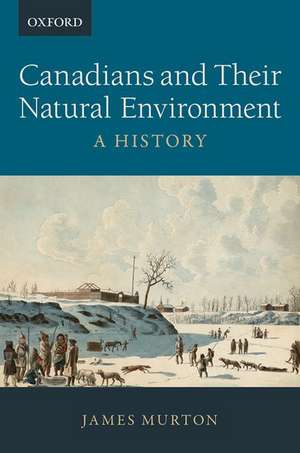Canadians and Their Natural Environment: A History
Autor James Murtonen Limba Engleză Paperback – 14 apr 2021
Preț: 342.24 lei
Nou
Puncte Express: 513
Preț estimativ în valută:
65.49€ • 70.03$ • 54.60£
65.49€ • 70.03$ • 54.60£
Carte disponibilă
Livrare economică 27 martie-10 aprilie
Preluare comenzi: 021 569.72.76
Specificații
ISBN-13: 9780199025466
ISBN-10: 0199025460
Pagini: 352
Ilustrații: 59 black and white illustrations
Dimensiuni: 157 x 236 x 16 mm
Greutate: 0.54 kg
Editura: OUP CANADA
Colecția OUP Canada
Locul publicării:Toronto, Canada
ISBN-10: 0199025460
Pagini: 352
Ilustrații: 59 black and white illustrations
Dimensiuni: 157 x 236 x 16 mm
Greutate: 0.54 kg
Editura: OUP CANADA
Colecția OUP Canada
Locul publicării:Toronto, Canada
Recenzii
Murton states that he could not have written this environmental history were it not for the outpouring of scholarship in Canadian environmental studies over the last 30 years....The introduction is especially clear in laying out the author's intention to explore the relationships among humans (both Indigenous peoples and settlers) and nature in Canada, indicating the importance of food over politics and of shelter over art. This mantra sets the stage for Murton's examinations of various historical eras and the particular environments they might develop. Today, climate change is in the spotlight, and an entire chapter considers the many ways in which it might manifest and the solutions that might be applied. The final chapter...is important for Canadians and for anyone concerned about climate change and other environmental issues.
Focusing on the ways that the peoples of Canada have relied on their environments to support their lives and their livelihoods from prehistoric times to the present, Murton succeeds in showing how the relationship between people and their environment has been profoundly intertwined with class and ethnic conflict, and with political and economic transformations over time. Canadians and Their Natural Environment provides a fresh look at the ways in which different Canadians understood and made sense of their varied and changing relationship with the environment.
We mostly use 'radical' nowadays to mean 'extreme,' but it also means 'fundamental.' Murton's book is radical in both senses: a reimagining of Canadian history told by exploring how people have obtained food and shelter, the basic necessities of life. This is also an impressive distillation of research in this century's most dynamic historical subfield, environmental history.
I enjoyed reading Canadians and Their Natural Environment. Murton skillfully weaves Indigenous content throughout the text rather than separating it from the rest of the book.
Murton's book challenges how we understand Canadian history by looking at the past in new ways and asking fundamental questions about how people sustained lives, livelihoods, and families under changing environmental conditions. Like the best work in environmental history, this book shifts our perspective on the past by showing how people have shaped and been shaped by the more-than-human world.
Focusing on the ways that the peoples of Canada have relied on their environments to support their lives and their livelihoods from prehistoric times to the present, Murton succeeds in showing how the relationship between people and their environment has been profoundly intertwined with class and ethnic conflict, and with political and economic transformations over time. Canadians and Their Natural Environment provides a fresh look at the ways in which different Canadians understood and made sense of their varied and changing relationship with the environment.
We mostly use 'radical' nowadays to mean 'extreme,' but it also means 'fundamental.' Murton's book is radical in both senses: a reimagining of Canadian history told by exploring how people have obtained food and shelter, the basic necessities of life. This is also an impressive distillation of research in this century's most dynamic historical subfield, environmental history.
I enjoyed reading Canadians and Their Natural Environment. Murton skillfully weaves Indigenous content throughout the text rather than separating it from the rest of the book.
Murton's book challenges how we understand Canadian history by looking at the past in new ways and asking fundamental questions about how people sustained lives, livelihoods, and families under changing environmental conditions. Like the best work in environmental history, this book shifts our perspective on the past by showing how people have shaped and been shaped by the more-than-human world.
Notă biografică
James Murton is Associate Professor of History at Nipissing University and a member of the Program in Environmental Science/Studies. He is part of the executive committee and the editorial board at the Network in Canadian History and Environment (NiCHE) and an Associate of the Wilson Institute for Canadian History at McMaster University.
